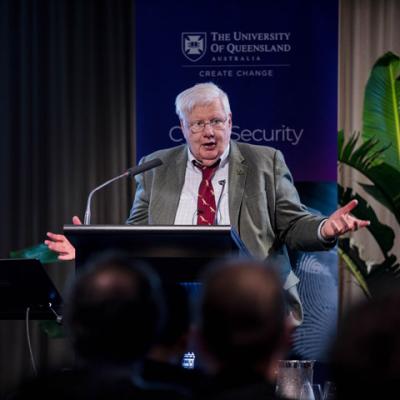
Master of Cyber Security
Overview
Become a leader in cyber security, equipped with new and exciting ways to meet the security challenges of the future.
To get ahead in cyber security you need more than just technical skills. Our Cyber Security program will develop your broader strategic cyber security insight while deepening specialist skills and experience, preparing you to lead at a technological, organisational or policy level.
This program will give you a deep understanding of cyber security’s impact on every aspect of modern life, and to empower cyber security leaders for a resilient, more productive digital future.
You'll study specialised topics such as cryptography, cyber criminology, cyber defence and leadership to develop an understanding of the global cyber security landscape, informed by industry and government experts.
You'll gain integrated learning experience and advance your professional network by working with a cohort from diverse backgrounds in technology, business, mathematics, social science and law. Plus you'll undertake an industry or research-based project to improve your workforce readiness.
As a Master of Cyber Security you'll be able to look at the field from a different angle, ask bigger questions, and find new ways to tackle real and emerging cyber security threats.
An interdisciplinary approach
It’s estimated that Australia will need an additional 18,000 cyber security professionals by 2026. So, in partnership with industry experts, UQ has developed the first program to genuinely address the interdisciplinary nature of this field, while meeting the need for deep technical specialisation in core areas.
Program highlights
- Study specialised topics such as cryptography, cyber criminology, cyber defence and leadership.
- Gain integrated learning experience and advance your professional network.
- Undertake an industry or research-based project to improve your workforce readiness.
- Acquire a global perspective on cyber security and information security fundamentals.
Fields of study
Tailor your studies to suit your goals. This program offers these options:
- Cryptography
- Cyber Defence
- Leadership
How you'll learn
Your learning experiences are designed to best suit the learning outcomes of the courses you choose.
- Lectures
- Tutorials
- Work placements
- Laboratory work
What you'll study
At UQ, degrees are called 'programs' and subjects are called 'courses'. Here's a sample of the courses you could study in this program:
- Fundamentals of Cyber Security
- Information Security Essentials
- Cyber Security Governance, Policy, Ethics and Law
- Cyber Criminology and Global Security
Dual programs
Double your skills and your opportunities with a dual degree. You can study the Master of Cyber Security as a part of these dual programs:
Career possibilities
Postgraduate study can take you anywhere. Depending on which field you choose, here are some of the careers you could be on your way to:
- Cyber risk and governance consultant
- Penetration tester
- Cyber security analyst
- IT security specialist
- Cyber security designer
- Forensic analyst
- Risk and compliance analyst
- Cloud infrastructure engineer
- Incident response manager
- Cyber security policy officer
Graduate salary
Computing & information systems (postgraduate)
compared.edu.au
Next steps after graduation
- The Australian Cyber Security Market is predicted to triple in size by 2026.
- Cyber security specialist was the #2 emerging job of 2020 (LinkedIn 2020 Emerging Jobs Report).
Events
See all eventsStories
See all stories
UQ people
How the UQ Pro Bono Centre is shaping career-ready graduates
5-minute read

UQ people
The Rhodes Scholar planning to pay her UQ law degree forward
7-minute read
Stories
See all stories
UQ people
How the UQ Pro Bono Centre is shaping career-ready graduates
5-minute read

UQ people
The Rhodes Scholar planning to pay her UQ law degree forward
7-minute read
Entry requirements
Entry requirements
It's possible to complete this degree in 2 years or 1.5 years depending on your qualifications and experience.
You can apply for any duration as long as you meet the entry requirements. You may also be eligible to apply for credit or exemptions to shorten your degree further. You'll graduate with the same qualification no matter how long you take to complete the degree.
2-year degree (32 units of study)
To be eligible to complete the degree in 2 years full-time (or part-time equivalent)full-time (only available as full-time study), you'll need:
- a bachelor's degree (or equivalent) in any discipline, or
- a graduate certificate or graduate diploma or master's degree in any discipline, or
- to have successfully completed 3 years of study towards an approved qualification at an overseas partner institution, with a formal pathway to the Master of Cyber Security.
You must have a grade point average (GPA) of 5.0 on a 7-point scale in your previous qualification.
For the Leadership field of study, you'll also need:
- 2 years of supervisory or management experience, such as managing a team or people, client accounts or major projects, resource planning, or direct responsibility for financial delegations.
* Please note that if a graduate certificate (or graduate diploma) from the same program suite is used as the basis of entry into the program and you do not have a degree in the relevant discipline, you will not be eligible for credit towards the Masters program.
1.5-year degree (24 units of study)
If you have relevant prior learning or experience, you can reduce the number of courses you need to complete and graduate in less time.
To be eligible to complete the degree in 1.5 years full-time (or part-time equivalent)full-time (only available as full-time study), you'll need:
- a bachelor's degree (or equivalent) in a relevant discipline (see below), or
- a graduate certificate or graduate diploma or master's degree in a relevant discipline (see below).
You must have a grade point average (GPA) of 5.0 on a 7-point scale in your previous qualification.
For the Cyber Defence field of study, you¿ll need to have successfully completed at least three of the following:
- Applied Cryptography, Computer Networking, Databases, Web Application Programming, Operating Systems, Concurrency, Distributed Systems, Cloud Computing, Mobile App Development, Internet of Things, Systems Administration, or Introduction to Programming.
For the Cryptography field of study, you¿ll need to have successfully completed at least three of the following:
- Number Theory, Discrete Mathematics, Linear Algebra, Engineering Mathematics, Combinatorics, Probability and Statistics, Calculus, Set Theory, or Mathematical Logic.
For the Leadership field of study, you'll also need:
- 5 years of supervisory or management experience, such as managing a team or people, client accounts or major projects, resource planning, or direct responsibility for financial delegations.
* Please note that if a graduate certificate (or graduate diploma) from the same program suite is used as the basis of entry into the program and you do not have a degree in the relevant discipline, you will not be eligible for credit towards the Masters program.
Relevant disciplines for previous qualifications
Relevant Disciplines depend on the field of study you intend to choose.
- For the Cyber Defence field of study, relevant disciplines include: computer science, information technology, computer engineering, mechatronics, electrical and electronic engineering, mathematics or software engineering.
- For the Cryptography field of study, relevant disciplines include: mathematics, statistics, computer science, physics, actuarial science and information technology.
- For the Leadership field of study, relevant disciplines include: commerce, management, business, accounting, information technology, computer science and leadership.
Related programs
Depending on your previous qualifications and current goals, you might want to consider
one of these related programs:
English language requirements
IELTS overall 6.5; reading 6; writing 6; speaking 6; listening 6. For other English Language Proficiency Tests and Scores approved for UQ
TOEFL iBT (including Paper Edition) - Overall 87, listening 19, reading 19, writing 21 and speaking 19.
PTE Academic - Overall Score of 64 and 60 in all sub bands.
BE - A minimum overall grade of 4 plus a minimum grade of C in all macro skills.
CES - Overall 176 and 169 in all sub bands.
OET is not accepted.
There are other ways to meet the English language requirements. For some programs, additional conditions apply.
Inherent requirements
To complete this degree, you have to meet its inherent requirements by demonstrating essential skills and attributes. Read the inherent requirements before you apply.
Student visas
International students who are accepted into full-time study in the Master of Cyber Security are eligible to apply for an Australian student visa (subclass 500).
There are a number of requirements you must satisfy before a visa is granted, including the Genuine Student (GS) requirement.
Fields of study
Fields of study
Tailor your studies to suit your goals. This program offers these options:
Fields of study
Tailor your studies to suit your goals. This program offers these options:
Fees and Scholarships
Indicative annual fee
Approximate yearly cost of tuition (16 units). Your fees will vary according to your selected courses and study load. Fees are reviewed each year and may increase.
$11,245
2026
Approximate yearly cost of full-time tuition (16 units). Your fees will vary according to your study load. Fees are reviewed each year and may increase.
AUD $58,056
2026
Government assistance
Financial aid
As an international student, you might be eligible for financial aid – either from your home country, or from the Australian Government.
HECS-HELP
Domestic places in the Master of Cyber Security are Commonwealth supported, as long as you meet all Commonwealth supported place eligibility requirements.
This means the cost of your education is shared between you and the Australian Government. Instead of tuition fees, Commonwealth supported students pay what are called student contribution amounts.
If you have a Commonwealth supported place, you may also be eligible for HECS-HELP. This is an Australian Government loan scheme to assist eligible students with the cost of their student contribution amounts.
Centrelink support
The Australian Government offers a number of income-support payments to eligible Australian university students.
Scholarships
You may be eligible for more than 100 scholarships, including:
How to apply
Applying online
All international applications should be submitted to UQ. If you prefer, you can use an approved UQ agent near you.
The program code for the Master of Cyber Security is 5257.
This program is available in multiple durations. You can apply for any duration as long as you meet the entry requirements.
When you apply, select your preferred duration. If you don't meet the requirements for your first preference, we'll automatically consider you for entry into a longer duration.
Applying online
All domestic applications should be submitted to UQ.
The program code for the Master of Cyber Security is 5257.
This program is available in multiple durations. You can apply for any duration as long as you meet the entry requirements.
When you apply, select your preferred duration. You can also ask us to consider you for a longer duration if you don't meet the entry requirements for your first preference.
Important dates
The closing date for this program is:
- To commence study in semester 2 - May 31 of the year of commencement.
- To commence study in semester 1 - November 30 of the previous year.
Visa processing times vary. Apply and accept your offer as early as you can.
To learn more about UQ dates, including semester start dates, view the Academic Calendar.
Important dates
The closing date for this program is:
- To commence study in Semester 1 - January 31 of the year of commencement.
- To commence study in Semester 2 - June 30 of the year of commencement.
To learn more about UQ dates, including semester start dates, view the Academic Calendar.
Aboriginal and Torres Strait Islander applicants
For support with applying – or if you have any questions about university life – get in touch with our Aboriginal and Torres Strait Islander Studies (ATSIS) Unit.
Explore other programs
Express yourself. And your interest.
They say choosing a degree is hard, which is why we've made it easy. Register your interest and we'll send you everything you need to know about applying to UQ.






